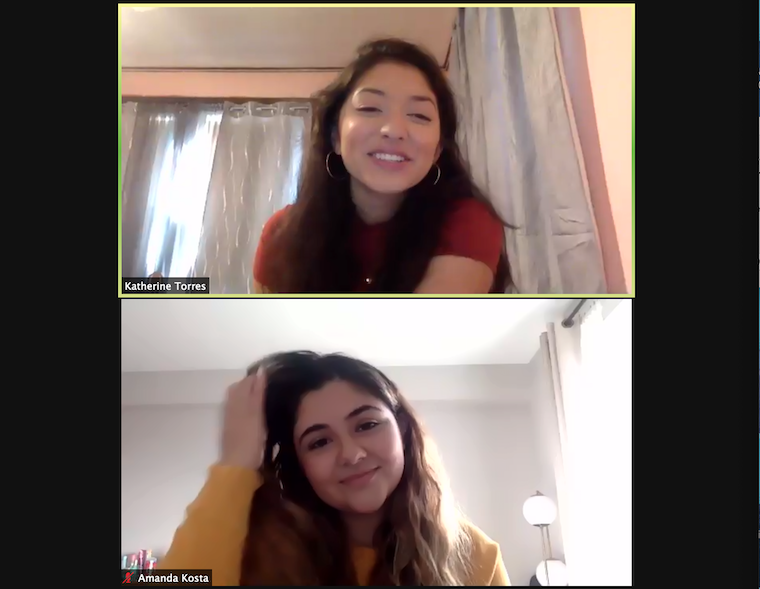On Wednesday, November 11, Winsor’s First Generation Experience Affinity Group led an inspired assembly, particularly timely and celebratory in the wake of the November election that will place the first first-generation American in the White House as Vice President. The assembly featured the reveal of a collaborative student project nearly a year in the making, followed by presentations, and a panel discussion with three distinguished speakers who shared their personal experiences as they pertain to their identities as first-generation Americans.
To begin the program, co-leaders Amanda Kosta ’22 and Katherine Torres ’22 and Amanda the students showed a video they have been working on for many months, featuring a group of first-generation Winsor students responding to a series of questions to shed light on the struggles and strengths of being first. Though they come from different nations around the globe, including Columbia, Taiwan, Nicaragua, Nigeria, India and Korea to name a few, the students share common ground, from facing “the challenge of trying to balance and fit in to both cultures simultaneously,” to appreciating the benefit of embracing the best of both worlds (which in all cases seems to include enjoying their culture’s culinary delights!). Articulating what it means to be a first-generation American, the students echoed one another in the belief that it is a privilege, and in sharing gratitude and optimism. Affinity group co-leader Katherine Torres eloquently said, “It means being a bridge. I am a bridge between two cultures. And it’s beautiful,” adding, “I love being first gen. It’s made me who I am today…and connected me to so many different people.”
To represent the significance of each of their families uprooting from their native land, and planting roots deep in the soil of this new country, the students planted a tree on campus. The tree is “our gift to Winsor, the school that has helped our families inch closer to the American dream that our families came to this country for.”
Following the video, the students shared a presentation about immigrants in America to help educate others about the facts and figures, and ways to support immigrant rights. And then they brought the humor as they shared truisms in their presentation, “Things First Gen Americans are CEOs Of”, covering things from how being translators for their families at a young age put them ahead of the game; to the understanding that all your time should be spent on homework, and hence the “one-time fun limit.”
An engaging panel discussion followed, featuring Dr. Dehlia Umunna P’20, Professor of Law, Harvard Law School and head of the Criminal Justice Clinic, Councilor Michelle Wu, Boston City Councilor, At-Large, and Mr. William Yepes-Amaya, Middle School Spanish Teacher, at Shady Hill School. Each shared stories of how they came to the United States, and the challenges and experiences that shaped who they are and the paths they chose to follow. And although they come from very different backgrounds, and pursued very different paths, the three panelists were motivated by the desire to pursue a better life, be accepted for who they are, and help break down barriers that stand in the way of equity and justice for all.
Reflecting on his own struggles for acceptance as an immigrant and a gay man, Mr. Yepes-Amaya shared, “You hold both, privilege and oppression. You need to hold them both up to acknowledge your full self.”
Always an educator, he underscored that “history isn’t something that happens in books. History is something that’s happening every day,” and that makes the need for change immediate. We must work each day to “honor humanity,” he said, and “create space for others to come together, and create a safe space that honors your identity and the identity of others.”
A pioneer for change, Dr. Umunna recalled that in the 90s in the U.S., it “wasn’t cool to be unapologetically Black, or Nigreian. You worried about your food, how it smelled, what you wore.” Today, she says she sees a shift to people unapologetically embracing their culture – something she does, and finds encouraging. But when it comes to equality in opportunity and under the law, there remains much work to be done. “Becuase I was an immigrant, I am consicous of the frailties and inequities.” Having started her career as a public defender, she is steadfast in her mission. “I will always be a voice to the voiceless, and I will always speak for the marginalized. I will do all I can to make sure they are seen, and do all I can to make sure they get justice.”
For Councilor Wu, the same desire to be a part of the change needed to ensure all people feel safe, welcome, and supported in their community is what propelled her to run for public office. “It’s central to why I’m in city council, running for mayor. My family experience was so separate from the idea of being in room where policy was being made.” Accustomed to never seeing anyone who looked like her in the room, or on the T.V., she said it was when a family member faced a mental health crisis and needed help that she realized “how big the gaps were. We have so many resources, but we aren’t connecting them to people who need help.”

